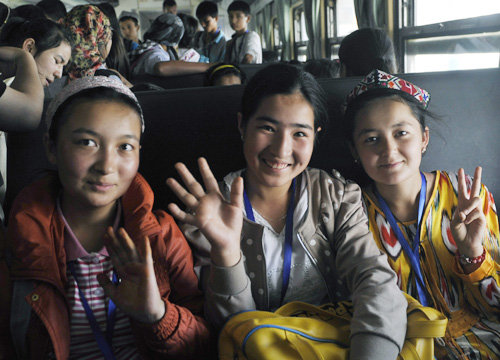|
 |
|
NEW GOAL: Students from Xinjiang ride a train that will take them to boarding schools in developed cities in east China on August 27, 2012 (ZHAO GE) |
In the vast and sparsely populated Xinjiang Uygur Autonomous Region in China's northwest, more than half of the residents are members of minority ethnic groups with native languages other than Mandarin Chinese. Education is complicated by the region's linguistic, geographic and socioeconomic conditions.
"In my hometown, educational resources are scarce and dropout rates are very high," said Merhaba, a 13-year-old Uygur girl from Kashgar Prefecture. "Almost all my cousins dropped out after middle school or even primary school. My brother and I are the only ones to go out of Kashgar for education."
Merhaba is a student at No.66 Middle School in Urumqi, the capital city of Xinjiang. Her exam scores earned her admission to the elite junior high school in 2011. "Here, we have better teachers and better learning facilities," she said.
For a better future
Launched in September 2000, a merit-based program has enabled students from remote areas in Xinjiang to attend prestigious high schools in developed cities in China's east. The program offers students from Xinjiang free tuition, room and board.
In 2000, a total of 1,000 students were admitted to 12 key schools, and the number grew year by year. By 2012, as many as 8,330 students had been admitted to 85 elite schools in 44 eastern cities. Altogether 51,300 students have benefited from the program since its inception. Ninety percent are from minority ethnic groups.
In 2003, the Xinjiang Regional Government designated No.66 Middle School in Urumqi to groom promising students and help them make the even more difficult transition into schools in major cities in east China.
Now the school has more than 900 students, of which 90 percent are students from rural and pastoral areas. Fourteen-year-old Rhustan from Kashgar has been studying at the school for nearly two years. "The teaching quality here is a lot better and it makes it easier for us to gain knowledge," said Rhustan, who speaks fluent English.
It's not easy for a child to leave home and go to a faraway city to study at the tender age of 12, but Rhustan is mature for his age, and pragmatic and filial in equal measure. "Although they miss me a lot, my parents think it is the right decision for a better future and they are proud of me," he said.
For Li Ji, though, studying in Urumqi is not getting easier, but much harder. The 14-year-old Han boy, also from Kashgar, is now in the eighth grade at No.66 Middle School.
"It was easy for me to score in the top three in my previous school in Kashgar, but here all the top students from different places in Xinjiang gather, and I have to work very hard to keep up."
To enroll at No.66 Middle School, according to Li, candidates had to score more than 275 out of 300 on a selection exam. After three years' study, the students must take yet another selection exam to enroll in key high schools in eastern cities. In the later exams, they have to score more than 690 out of 750 to qualify.
"It is a big challenge," said Li. "I cannot make mistakes."
| 